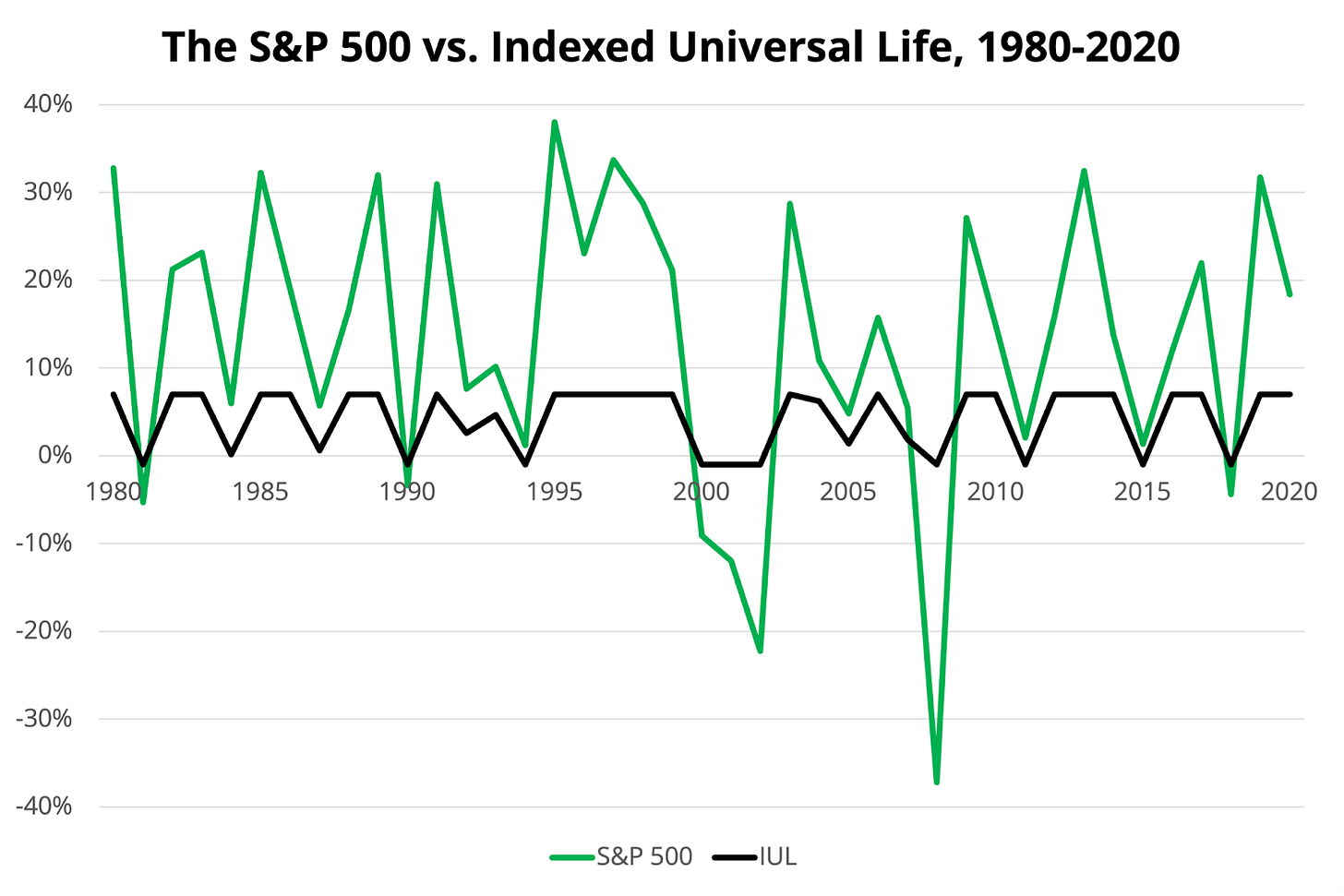All Categories
Featured
Table of Contents
Do they compare the IUL to something like the Vanguard Total Supply Market Fund Admiral Shares with no lots, an expense ratio (ER) of 5 basis points, a turn over ratio of 4.3%, and an extraordinary tax-efficient record of distributions? No, they compare it to some dreadful proactively managed fund with an 8% load, a 2% ER, an 80% turnover ratio, and a horrible record of short-term resources gain distributions.
Shared funds often make yearly taxable circulations to fund owners, also when the worth of their fund has actually dropped in value. Shared funds not just need earnings coverage (and the resulting annual taxes) when the shared fund is increasing in worth, yet can likewise impose revenue taxes in a year when the fund has decreased in value.
That's not how shared funds work. You can tax-manage the fund, harvesting losses and gains in order to minimize taxed distributions to the investors, however that isn't somehow mosting likely to change the reported return of the fund. Only Bernie Madoff types can do that. IULs stay clear of myriad tax obligation catches. The possession of shared funds may call for the mutual fund owner to pay approximated taxes.

IULs are very easy to position to ensure that, at the owner's fatality, the recipient is exempt to either earnings or estate tax obligations. The very same tax reduction strategies do not work virtually as well with mutual funds. There are numerous, often expensive, tax catches connected with the timed purchasing and selling of mutual fund shares, traps that do not use to indexed life Insurance policy.
Possibilities aren't really high that you're mosting likely to undergo the AMT because of your common fund circulations if you aren't without them. The remainder of this one is half-truths at finest. For example, while it is true that there is no income tax obligation because of your beneficiaries when they inherit the earnings of your IUL plan, it is likewise real that there is no earnings tax obligation because of your successors when they inherit a common fund in a taxed account from you.
Iul For Dummies
There are far better ways to avoid estate tax problems than buying financial investments with reduced returns. Shared funds might cause income tax of Social Protection benefits.

The development within the IUL is tax-deferred and might be taken as tax obligation free earnings through fundings. The policy proprietor (vs. the shared fund manager) is in control of his/her reportable earnings, hence allowing them to reduce and even remove the taxes of their Social Safety advantages. This one is great.
Below's another marginal problem. It's real if you acquire a mutual fund for claim $10 per share just before the distribution day, and it distributes a $0.50 circulation, you are after that mosting likely to owe taxes (most likely 7-10 cents per share) despite the reality that you haven't yet had any gains.
In the end, it's truly concerning the after-tax return, not exactly how much you pay in taxes. You're likewise possibly going to have even more cash after paying those tax obligations. The record-keeping needs for having shared funds are substantially much more intricate.
With an IUL, one's documents are maintained by the insurance provider, duplicates of annual statements are mailed to the owner, and circulations (if any) are completed and reported at year end. This is also sort of silly. Of program you must maintain your tax records in case of an audit.
Universal Life Insurance As A Retirement Plan
Barely a factor to acquire life insurance coverage. Common funds are frequently part of a decedent's probated estate.
Additionally, they are subject to the hold-ups and costs of probate. The earnings of the IUL policy, on the other hand, is constantly a non-probate distribution that passes beyond probate directly to one's called beneficiaries, and is therefore exempt to one's posthumous lenders, undesirable public disclosure, or similar hold-ups and costs.
We covered this under # 7, however just to recap, if you have a taxable common fund account, you should place it in a revocable depend on (or perhaps simpler, make use of the Transfer on Fatality classification) in order to avoid probate. Medicaid disqualification and lifetime revenue. An IUL can give their proprietors with a stream of earnings for their entire life time, no matter for how long they live.

This is advantageous when organizing one's events, and transforming possessions to income before an assisted living home confinement. Shared funds can not be transformed in a similar way, and are generally thought about countable Medicaid properties. This is another stupid one advocating that inadequate people (you recognize, the ones who require Medicaid, a federal government program for the bad, to spend for their assisted living facility) must use IUL rather than common funds.
Best Indexed Universal Life Insurance Policies
And life insurance looks horrible when contrasted relatively against a pension. Second, people that have cash to buy IUL above and beyond their pension are going to need to be awful at managing cash in order to ever get Medicaid to spend for their nursing home expenses.
Persistent and terminal health problem cyclist. All policies will permit a proprietor's very easy access to cash money from their plan, frequently forgoing any type of abandonment charges when such individuals experience a serious disease, need at-home care, or become restricted to an assisted living home. Mutual funds do not provide a comparable waiver when contingent deferred sales charges still relate to a mutual fund account whose proprietor needs to offer some shares to fund the costs of such a keep.
Books On Indexed Universal Life
Yet you get to pay even more for that advantage (cyclist) with an insurance plan. What a large amount! Indexed universal life insurance policy gives death advantages to the recipients of the IUL owners, and neither the proprietor nor the beneficiary can ever before lose cash as a result of a down market. Mutual funds offer no such guarantees or survivor benefit of any kind.
I definitely do not need one after I get to monetary self-reliance. Do I desire one? On standard, a buyer of life insurance pays for the true price of the life insurance coverage advantage, plus the prices of the policy, plus the profits of the insurance coverage company.
Universal Life Problems
I'm not totally certain why Mr. Morais threw in the whole "you can not lose money" once more below as it was covered rather well in # 1. He simply intended to repeat the most effective selling factor for these points I suppose. Again, you don't lose nominal bucks, however you can shed genuine dollars, in addition to face major possibility price as a result of reduced returns.

An indexed global life insurance policy plan owner might exchange their plan for a completely various plan without triggering earnings taxes. A mutual fund proprietor can stagnate funds from one common fund company to one more without marketing his shares at the previous (therefore activating a taxable event), and redeeming new shares at the latter, frequently based on sales fees at both.
While it holds true that you can trade one insurance coverage policy for an additional, the factor that people do this is that the first one is such a horrible policy that even after purchasing a brand-new one and undergoing the early, negative return years, you'll still appear in advance. If they were marketed the right plan the very first time, they shouldn't have any need to ever before trade it and go via the very early, unfavorable return years once again.
Latest Posts
Single Premium Universal Life Insurance Pros Cons
Iul Life Insurance Vs Whole Life
History Of Universal Life Insurance